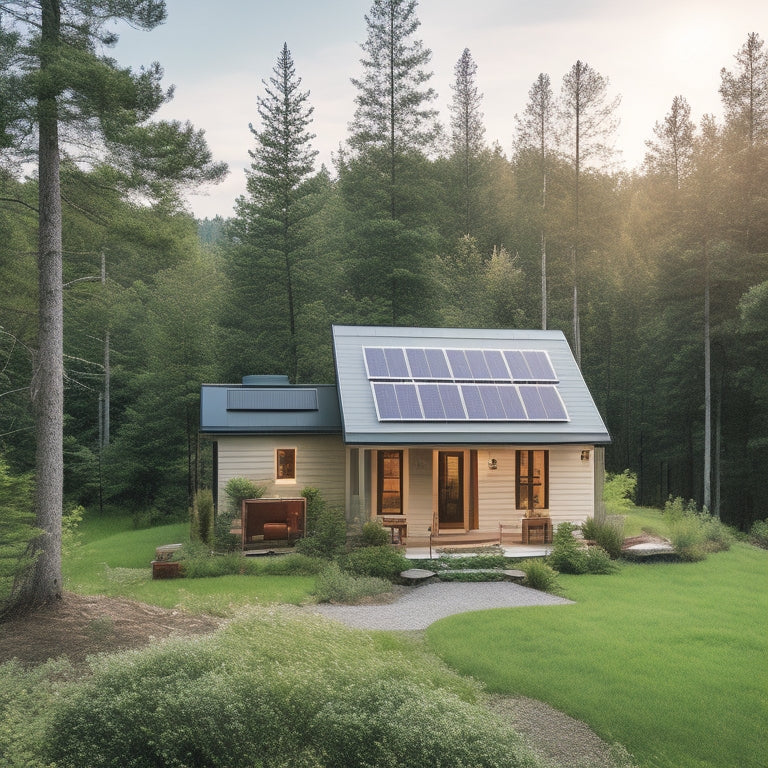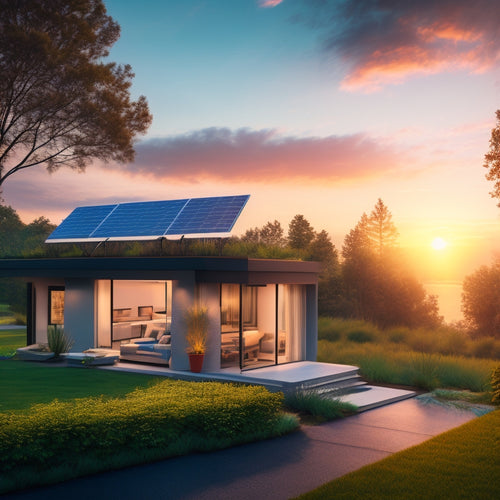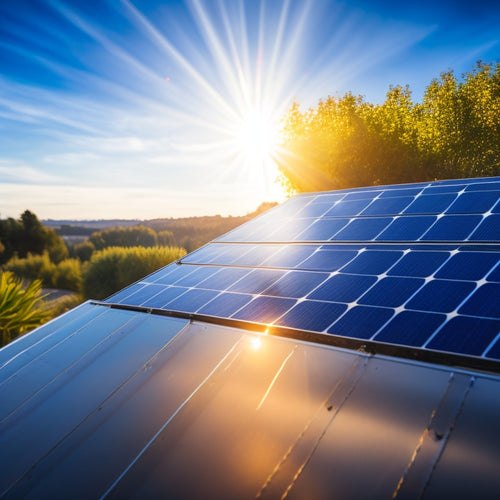
Powering Off-Grid Homes With Storage Systems
Share
As you move towards off-grid living, you'll need to assess your daily energy consumption, identify your alternative energy system size, and prioritize essential devices for efficient resource allocation. You'll want to choose the right battery type, considering factors like lifespan, efficiency, and discharge rates, and integrate it with renewable energy sources like solar, wind, or hydro power. Proper system sizing and load management will optimize battery life and energy autonomy. By understanding your energy needs and implementing energy conservation techniques, you'll be well on your way to achieving sustainable living - and there's more to uncover about maximizing your off-grid energy independence.
Key Takeaways
- Assess daily energy consumption to determine the required alternative energy system size and backup power options for off-grid homes.
- Properly sizing a solar storage system ensures optimal battery life, load management, and energy autonomy.
- Choosing the right battery type, such as lithium or lead acid, depends on factors like lifespan, efficiency, and maintenance requirements.
- Integrating renewable energy sources, like solar or wind power, with storage systems minimizes reliance on fossil fuels and enhances energy independence.
- Implementing energy conservation techniques, such as smart plugs and energy-efficient lighting, optimizes system performance and reduces energy waste.
Understanding Off-Grid Energy Needs
Energy independence beckons, but before you can unplug from the grid, you need to understand your energy needs. To achieve sustainable living and energy autonomy, you must determine how much power you require to support your off-grid lifestyle.
Assess your daily energy consumption by calculating your total watt-hours per day. Consider your lighting, heating, cooling, and appliance needs. This will help you identify the size of the alternative energy system you need, including backup power options.
Conducting an energy audit will help you prioritize your energy needs, focusing on essential devices for efficient resource allocation. Renewable resources like solar, wind, or hydro power can provide the energy you need, reducing your environmental impact.
Benefits of Solar Energy Storage
With your off-grid energy needs assessed, you can now focus on utilizing renewable resources to power your home.
Solar energy storage offers several benefits, starting with cost savings through reduced reliance on traditional energy sources. By utilizing solar power, you'll minimize your environmental impact while achieving energy independence Energy Independence and Autonomy.
This approach also enables communities through collective solar investments, enhancing independence and promoting self-sufficiency. In turn, this improves grid resilience by reducing the strain on the main grid.
Technology advancements have made installation processes more efficient, and financial incentives are often available to offset the initial investment. Proper maintenance tips guarantee system longevity, and user experiences have shown that solar energy storage can provide a reliable and sustainable source of power for your off-grid home.
Choosing the Right Battery Type
Your off-grid home's solar energy storage system is only as dependable as its battery bank. When choosing the right battery type, contemplate lithium batteries and lead acid batteries.
Lithium batteries offer a longer battery lifespan, higher charging efficiency, and faster discharge rates, but come at a higher cost. Lead acid batteries, on the other hand, are more affordable but require more maintenance and have a shorter lifespan.
Top-rated solar battery brands like Tesla, LG, and SimpliPhi are known for their innovative technology and performance reliable online retailers. Deep cycle batteries are a must for off-grid homes, as they can handle frequent charge and discharge cycles.
You'll also want to contemplate installation options, environmental impact, and maintenance requirements. Evaluating these factors will help you select the best battery type for your off-grid home's energy storage needs.
Sizing Your Solar Storage System
You'll need to determine your system's capacity needs by evaluating your energy usage patterns, including the total daily energy requirements of your off-grid home.
This involves calculating the power consumption of each appliance, as well as the overall energy demand during peak usage periods.
System Capacity Needs
System capacity needs involve calculating the required size of your solar storage system to guarantee it can meet your off-grid home's energy demands. You'll need to take into account factors like your daily energy usage, the number of days you want to be able to power your home without sunlight, and the depth of discharge (DOD) you're comfortable with for your batteries.
| Factors Affecting System Capacity | Description |
|---|---|
| Daily Energy Usage | Total energy consumed by your home in a day |
| Days of Autonomy | Number of days you want to power your home without sunlight |
| Depth of Discharge (DOD) | Percentage of battery capacity used before recharging |
Properly sizing your system guarantees you'll have enough power when you need it, while also optimizing battery life and load management.
Energy Usage Patterns
Energy usage patterns play a significant role in sizing your solar storage system, as they directly impact the amount of energy your system needs to provide.
Understanding your household's energy consumption and usage behavior is essential to determine the system's capacity. Analyze your household routines, including seasonal variations, to identify peak demand periods.
Energy monitoring tools can help you track your energy consumption and identify areas for improvement. By making lifestyle adjustments, such as implementing power management and device prioritization, you can reduce your energy needs.
Efficiency practices, like turning off lights and appliances when not in use, can also contribute to a more efficient system.
Integrating With Renewable Energy Sources
As you design your off-grid home, incorporating renewable energy sources is vital to minimizing your reliance on fossil fuels and reducing your carbon footprint.
Renewable integration is imperative in achieving energy independence, and hybrid systems can guarantee system reliability. By incorporating sustainable practices, you can reduce your environmental impact and rely on grid alternatives.
Load management is essential in optimizing energy production and consumption. Smart technology enables you to monitor and control your energy usage, guaranteeing maximum efficiency.
As you look to future trends, integrating renewable energy sources is a significant step in achieving a sustainable, off-grid lifestyle. By doing so, you'll be well on your way to reducing your reliance on non-renewable energy sources and minimizing your carbon footprint.
Maximizing Energy Efficiency and Savings
You'll want to implement energy harvesting strategies that optimize your system's performance, ensuring you're getting the most out of your renewable energy sources.
By doing so, you'll reduce energy waste and lower your overall energy consumption.
To achieve this, you'll need to assess your energy needs, identify areas of inefficiency, and apply targeted solutions to maximize your energy savings.
Energy Harvesting Strategies
By integrating multiple energy harvesting strategies, homeowners can greatly maximize their energy efficiency and savings, ultimately reducing their reliance on traditional power sources. You can combine different techniques to create a hybrid energy system that suits your off-grid home.
| Energy Harvesting Strategies | Benefits |
| Solar Panel Placement Optimization | Increased energy output |
| Wind Energy Integration | Reduced reliance on single energy source |
| Energy Monitoring Solutions | Real-time energy usage tracking |
| Battery Maintenance Tips | Extended battery lifespan |
| Renewable Resource Assessment | Identification of most suitable energy sources |
Optimizing System Performance
Most off-grid homes can recover up to 20% of their energy losses by fine-tuning their system performance.
You can achieve this by identifying areas of inefficiency and implementing system upgrades. Performance monitoring tools can help you track your energy usage and pinpoint where improvements can be made.
By analyzing your energy data, you can optimize your system's configuration, adjust your energy harvesting strategies, and reduce energy losses.
Regularly reviewing your system's performance will help you identify opportunities for improvement and guarantee you're getting the most out of your off-grid energy system.
Reducing Energy Waste
Within the structure of off-grid homes, energy waste can silently drain your system's overall efficiency, leading to increased energy costs and a larger carbon footprint. To maximize energy efficiency and savings, it is crucial to implement energy conservation techniques. One effective approach is to utilize smart home technology, which enables you to monitor and control your energy consumption in real-time.
| Energy Conservation Technique | Description |
|---|---|
| Smart Plugs | Monitor and control energy usage of individual appliances |
| Energy-Efficient Lighting | Reduce energy consumption with LED bulbs |
| Power Strips | Eliminate standby power consumption |
| Energy Monitoring Systems | Track energy usage and identify areas for improvement |
Overcoming Common Off-Grid Challenges
Meeting the energy needs of an off-grid home can be a complex task, especially when faced with challenges such as variable renewable energy sources, limited energy storage, and harsh environmental conditions.
You'll need to develop strategies to overcome these obstacles. Building community support and adopting maintenance strategies can help guarantee your system runs smoothly. Financial incentives, such as tax credits or rebates, can offset the cost of technology advancements like energy-efficient appliances.
Familiarize yourself with local regulations and climate considerations to optimize your system's performance. Don't forget to prioritize emergency preparedness and sustainability practices.
Frequently Asked Questions
Can I Use a Generator as Backup for My Off-Grid Storage System?
You're considering a generator as backup for your off-grid storage system, which is a great idea, since 70% of off-grid homes use generators as a reliable backup source. You can choose from various generator types, such as diesel, natural gas, or propane, depending on your fuel options and specific needs.
How Often Should I Inspect and Maintain My Energy Storage System?
You should inspect your energy storage system every 3-6 months to guarantee peak performance and extend battery lifespan, as neglecting regular maintenance can lead to reduced capacity and premature system failure, requiring more frequent replacements.
Are Energy Storage Systems Compatible With All Types of Solar Panels?
As you envision your solar panel array utilizing the sun's energy, you wonder: are energy storage systems compatible with all types of solar panels? Rest assured, most energy storage systems seamlessly integrate with various solar panels, ensuring efficient energy storage integration, regardless of panel type or brand.
Can I Add More Batteries to My System in the Future if Needed?
You can easily upgrade your energy storage system in the future by adding more batteries, increasing your battery capacity to meet growing energy demands, and this future expansion is often accommodated by most systems' scalable designs.
Do Off-Grid Energy Storage Systems Require Special Installation Expertise?
When you're considering an off-grid energy storage system, you'll need to guarantee it's installed correctly, so you'll require specialized installation knowledge that meets specific installation requirements, and it's always best to follow expert recommendations to avoid potential safety risks and efficiency issues.
Related Posts
-

The Future of Residential Energy Storage
The future of residential energy storage looks promising and cost-effective for you. With lithium-ion battery prices ...
-

How Efficient Are Thin Film Solar Cells
Thin film solar cells provide an innovative approach to energy generation, boasting efficiency rates generally betwee...
-

Essential Hiking Lights for Safety and Fun
When you're hitting the trails, essential hiking lights are vital for safety and fun. A lightweight headlamp offers h...


